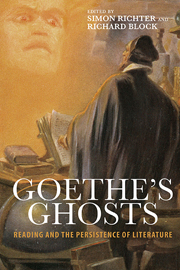Book contents
- Frontmatter
- Contents
- Introduction—Ghosts and the Machine: Reading with Jane Brown
- Part I The Ghosts of Goethe's Past
- Part II The Ghost That Keeps on Giving
- 6 Mephisto or the Spirit of Laughter
- 7 Shipwreck with Spectators: Ideologies of Observation in Goethe's Faust II
- 8 Constructing the Nation: Volk, Kulturnation, and Eros in Faust
- 9 Gretchen's Ghosts: Goethe, Adorno, and the Literature of Refuge
- 10 “I'll burn my books!”: Faust(s), Magic, Media
- Part III Spirited Encounters
- Bibliography of Jane K. Brown's Publications
- Notes on the Contributors
- Index
6 - Mephisto or the Spirit of Laughter
from Part II - The Ghost That Keeps on Giving
Published online by Cambridge University Press: 05 March 2014
- Frontmatter
- Contents
- Introduction—Ghosts and the Machine: Reading with Jane Brown
- Part I The Ghosts of Goethe's Past
- Part II The Ghost That Keeps on Giving
- 6 Mephisto or the Spirit of Laughter
- 7 Shipwreck with Spectators: Ideologies of Observation in Goethe's Faust II
- 8 Constructing the Nation: Volk, Kulturnation, and Eros in Faust
- 9 Gretchen's Ghosts: Goethe, Adorno, and the Literature of Refuge
- 10 “I'll burn my books!”: Faust(s), Magic, Media
- Part III Spirited Encounters
- Bibliography of Jane K. Brown's Publications
- Notes on the Contributors
- Index
Summary
Von allen Geistern die verneinten
ist mir die Schalk am wenigsten zur Last.
[Of all the spirits of negation
rogues like you bother me the least.]
—Goethe, Faust, 338-39As many of his enemies have repeatedly emphasized, laughter is the devil. A long line of humorlessness, and especially a demonization of laughter, runs through the history of Christianity. Above all, it was the ancient Christian monkhood and the Church Fathers who accused laughter of being incompatible with human dignity. This tradition of an conservative hatred of laughter reaches from the seventeenth century's Jesuit and Jansenist critique of the comedy of the seventeenth century to Charles Baudelaire's essay De L'Essence du rire (1855), in which he reveals laughter to be the signature of fallen humanity, the trait of the satanic in mankind: “un des plus clairs signes sataniques de l'homme” (one of the clearest satanic signs of man). In paradise, laughter would have been unknown, and Christ never laughed—but he did cry—which, for Baudelaire, confirmed the antidivine character of laughter.
Two major works of modern art and literature, not least inspired by Baudelaire, have moved laughter into the sphere of evil. It is in Wagner's Parsifal that Kundry, the female main character, laughed at the cross-bearing Jesus on his journey of suffering and, as a result, was condemned like Ahasuerus, the eternal Jew, to wander through history until the end of days in “cursed laughter” (verfluchtem Lachen).
- Type
- Chapter
- Information
- Goethe's GhostsReading and the Persistence of Literature, pp. 111 - 125Publisher: Boydell & BrewerPrint publication year: 2013



